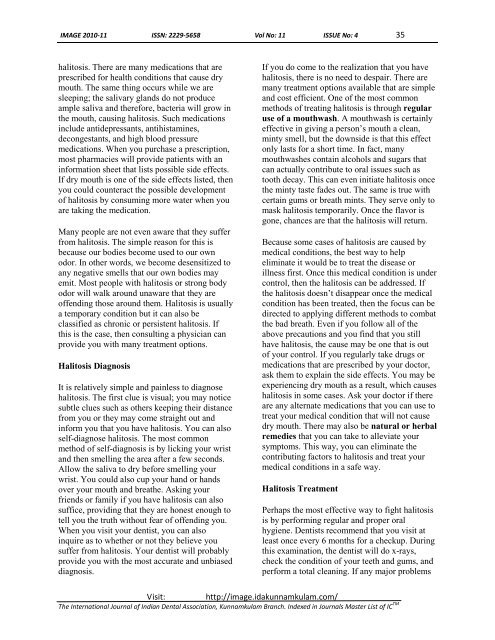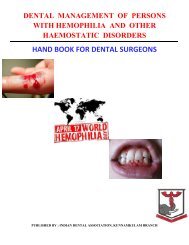'satisfactory smile' with a restorative approach - Indian Dental ...
'satisfactory smile' with a restorative approach - Indian Dental ...
'satisfactory smile' with a restorative approach - Indian Dental ...
You also want an ePaper? Increase the reach of your titles
YUMPU automatically turns print PDFs into web optimized ePapers that Google loves.
IMAGE 2010-11 ISSN: 2229-5658 Vol No: 11 ISSUE No: 4 35<br />
halitosis. There are many medications that are<br />
prescribed for health conditions that cause dry<br />
mouth. The same thing occurs while we are<br />
sleeping; the salivary glands do not produce<br />
ample saliva and therefore, bacteria will grow in<br />
the mouth, causing halitosis. Such medications<br />
include antidepressants, antihistamines,<br />
decongestants, and high blood pressure<br />
medications. When you purchase a prescription,<br />
most pharmacies will provide patients <strong>with</strong> an<br />
information sheet that lists possible side effects.<br />
If dry mouth is one of the side effects listed, then<br />
you could counteract the possible development<br />
of halitosis by consuming more water when you<br />
are taking the medication.<br />
Many people are not even aware that they suffer<br />
from halitosis. The simple reason for this is<br />
because our bodies become used to our own<br />
odor. In other words, we become desensitized to<br />
any negative smells that our own bodies may<br />
emit. Most people <strong>with</strong> halitosis or strong body<br />
odor will walk around unaware that they are<br />
offending those around them. Halitosis is usually<br />
a temporary condition but it can also be<br />
classified as chronic or persistent halitosis. If<br />
this is the case, then consulting a physician can<br />
provide you <strong>with</strong> many treatment options.<br />
Halitosis Diagnosis<br />
It is relatively simple and painless to diagnose<br />
halitosis. The first clue is visual; you may notice<br />
subtle clues such as others keeping their distance<br />
from you or they may come straight out and<br />
inform you that you have halitosis. You can also<br />
self-diagnose halitosis. The most common<br />
method of self-diagnosis is by licking your wrist<br />
and then smelling the area after a few seconds.<br />
Allow the saliva to dry before smelling your<br />
wrist. You could also cup your hand or hands<br />
over your mouth and breathe. Asking your<br />
friends or family if you have halitosis can also<br />
suffice, providing that they are honest enough to<br />
tell you the truth <strong>with</strong>out fear of offending you.<br />
When you visit your dentist, you can also<br />
inquire as to whether or not they believe you<br />
suffer from halitosis. Your dentist will probably<br />
provide you <strong>with</strong> the most accurate and unbiased<br />
diagnosis.<br />
If you do come to the realization that you have<br />
halitosis, there is no need to despair. There are<br />
many treatment options available that are simple<br />
and cost efficient. One of the most common<br />
methods of treating halitosis is through regular<br />
use of a mouthwash. A mouthwash is certainly<br />
effective in giving a personís mouth a clean,<br />
minty smell, but the downside is that this effect<br />
only lasts for a short time. In fact, many<br />
mouthwashes contain alcohols and sugars that<br />
can actually contribute to oral issues such as<br />
tooth decay. This can even initiate halitosis once<br />
the minty taste fades out. The same is true <strong>with</strong><br />
certain gums or breath mints. They serve only to<br />
mask halitosis temporarily. Once the flavor is<br />
gone, chances are that the halitosis will return.<br />
Because some cases of halitosis are caused by<br />
medical conditions, the best way to help<br />
eliminate it would be to treat the disease or<br />
illness first. Once this medical condition is under<br />
control, then the halitosis can be addressed. If<br />
the halitosis doesnít disappear once the medical<br />
condition has been treated, then the focus can be<br />
directed to applying different methods to combat<br />
the bad breath. Even if you follow all of the<br />
above precautions and you find that you still<br />
have halitosis, the cause may be one that is out<br />
of your control. If you regularly take drugs or<br />
medications that are prescribed by your doctor,<br />
ask them to explain the side effects. You may be<br />
experiencing dry mouth as a result, which causes<br />
halitosis in some cases. Ask your doctor if there<br />
are any alternate medications that you can use to<br />
treat your medical condition that will not cause<br />
dry mouth. There may also be natural or herbal<br />
remedies that you can take to alleviate your<br />
symptoms. This way, you can eliminate the<br />
contributing factors to halitosis and treat your<br />
medical conditions in a safe way.<br />
Halitosis Treatment<br />
Perhaps the most effective way to fight halitosis<br />
is by performing regular and proper oral<br />
hygiene. Dentists recommend that you visit at<br />
least once every 6 months for a checkup. During<br />
this examination, the dentist will do x-rays,<br />
check the condition of your teeth and gums, and<br />
perform a total cleaning. If any major problems<br />
Visit: http://image.idakunnamkulam.com/<br />
The International Journal of <strong>Indian</strong> <strong>Dental</strong> Association, Kunnamkulam Branch. Indexed in Journals Master List of IC TM



